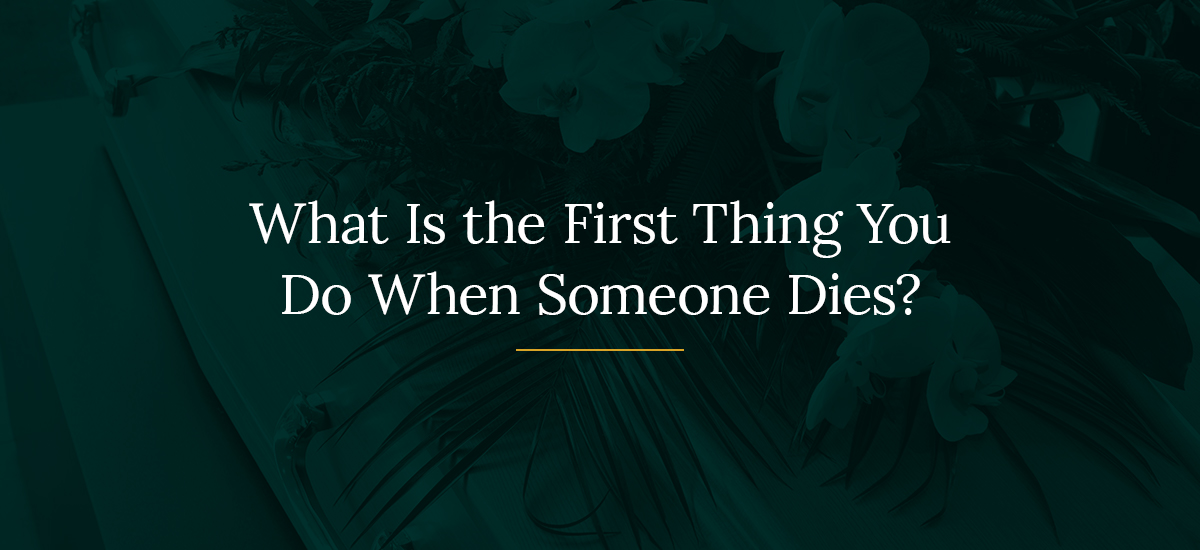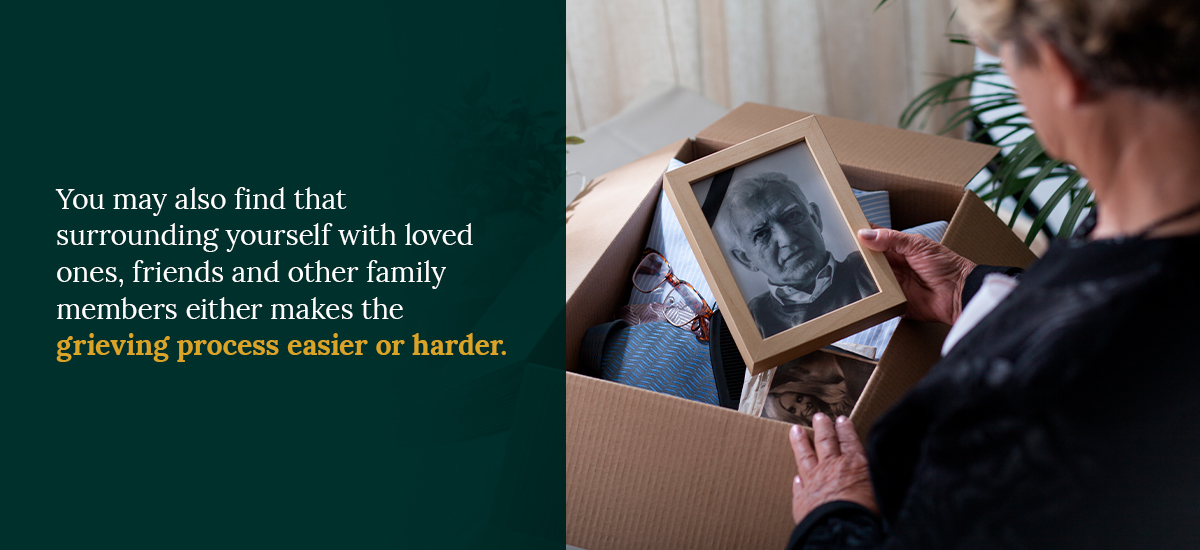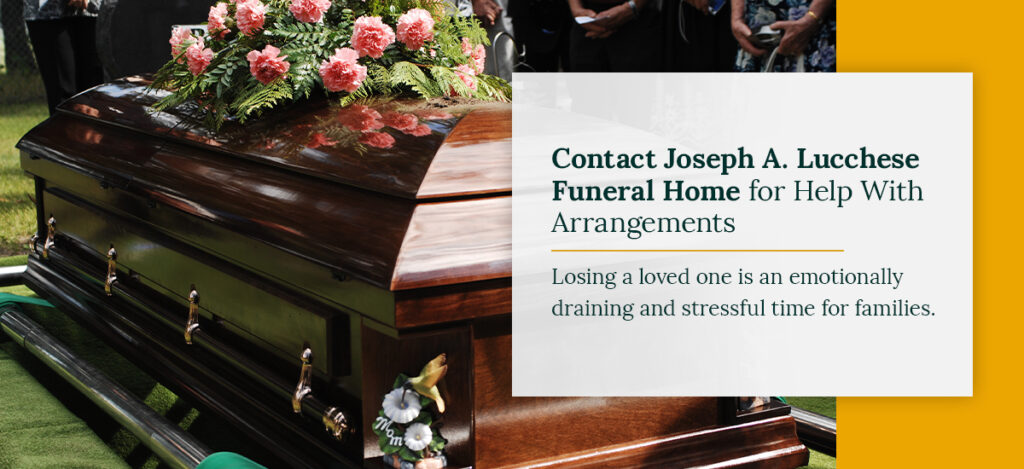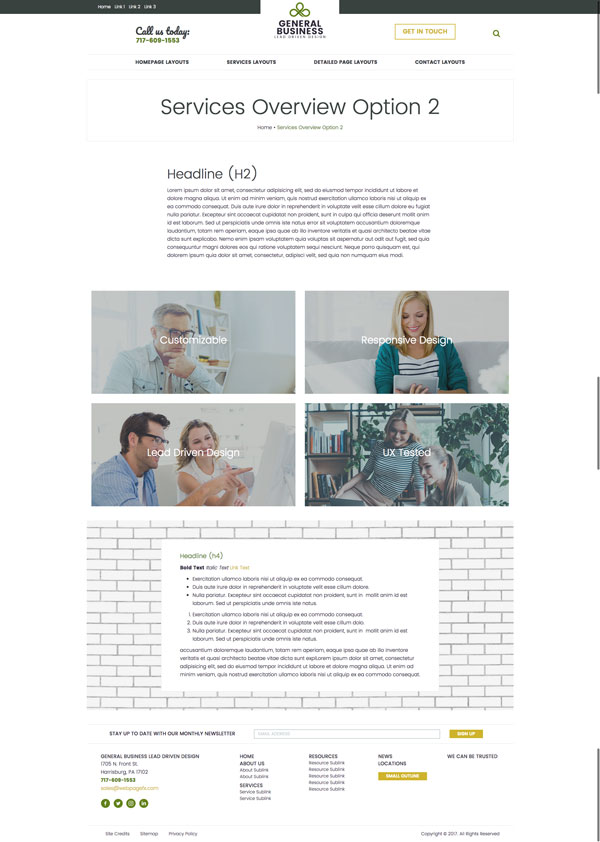
Experiencing the death of a parent or beloved family member is one of life’s most difficult and challenging times. There’s no manual on how to manage the loss of a parent or grandparent, and you will likely need help understanding step-by-step what to do when someone dies. At Joseph A. Lucchese Funeral Home, we understand the difficulties associated with losing a family member, so we’ve compiled this helpful resource and checklist to steer you in the right direction and keep you on track as you grieve your loss.
Get a Legal Pronouncement of Death
When compiling your what to do when a parent dies checklist, the first step is procuring a legal pronouncement of death. The legal pronouncement of death needs to be done as soon as possible. An authority such as a doctor in a hospital or nursing home or a hospice nurse typically handles procuring a legal pronouncement of death. Securing a legal pronouncement of death is the first step in creating a death certificate, which is a legal document similar to a birth certificate.
The death certificate is perhaps the most vital document you’ll receive after the loss of a loved one since you’ll need it to prove your loved one is deceased for life insurance and other death benefit accounts.
Inform Loved Ones
Near the top of your after-death checklist of responsibilities is informing family and loved ones of the family’s loss. Whether you make phone calls, send text messages or reach out to distant friends and family through social media, this is one of the most difficult steps of the process. You’ll likely want help from your siblings, your spouse or close family friends to reach out and inform other family members of the loss. It’s emotionally draining to continuously break the sad news to your relatives and family friends, so enlisting the help of those around you is vital to managing this process and informing everyone properly.
Check for Existing Funeral Plans
After you’ve secured a legal pronouncement of death and informed your loved ones, you’ll need to check for existing funeral plans. If the deceased is your parent, grandparent or spouse, you may already be aware of any preexisting funeral plans your loved one may have made while they were still alive. If you’re unsure about any existing funeral plans, your loved one may have outlined their last wishes in their will.
Taking time to discuss your loved one’s last wishes while they’re still alive is another way to ensure you meet their expectations after they die. These conversations can be difficult to have with family members, but they’re also necessary to understanding what to do when a parent dies by carrying out their final wishes. If there aren’t any existing funeral plans and you aren’t sure what the person’s last wishes were, you’ll want to get together with your family and meet with a trusted funeral home to make arrangements.

Take Time to Grieve
Once you’ve addressed all of the above, the next step is taking some time to yourself to grieve. There is no right or wrong way to grieve, and we all grieve differently. As long as you do so healthily, take as much time to grieve as you need. Avoid getting so caught up in managing your after-death checklist of responsibilities that you neglect your own emotions or feelings toward your recent loss. This isn’t healthy and leads to a sudden onslaught of emotions that can have devastating impacts on your emotional well-being. You might experience feelings of regret, anger, sadness or any combination of these and more.
You may also find that surrounding yourself with loved ones, friends and other family members either makes the grieving process easier or harder. The important thing is to take the time you need to grieve and do so in a healthy manner.
What Are the Next Steps?
The grieving process doesn’t end after the funeral and the last wishes of your deceased loved one have been carried out. This all usually happens within a week of losing your loved one, but the grieving process takes weeks, months and in some cases years to fully run its course. You’ll likely experience many emotions associated with the loss of your loved one. For some people, this is simply too much to handle on their own. Consider utilizing bereavement support groups, confiding in close friends and talking with family members to help you through the difficult times associated with this process.
From organizing legal documents to deciding how the family will pay for funeral expenses, you will probably need some help managing the process. Many helpful resources are available to assist you with creating a checklist of what to do when someone dies.
Frequently Asked Questions
No matter how much preplanning or organization goes into managing the death of a loved one, you may still have some questions. Here are some of the most frequently asked questions we get here at Joseph A. Lucchese Funeral Home.
1. What Is the First Thing You Do When Someone Dies?
The first thing you need to do when someone dies is get a legal pronouncement of death so the death certificate can be created.
2. Who Do You Call First When Someone Dies?
If a person dies at home on hospice care, you’ll need to call the hospice nurse right away. The hospice nurse will handle the legal pronouncement of death.
3. Who Do You Notify When Someone Dies?
Within a few weeks of your loved one’s passing, you’ll need to notify several different entities. Here’s a brief checklist of who to notify when someone dies:
- Social Security Administration to stop checks
- Financial institutions to close accounts
- Life insurance company to secure benefits
- Service providers to cancel any applicable services such as power, cable and car insurance
- Credit bureaus to prevent identity theft
4. What Happens to Bank Account When Someone Dies?
Bank accounts are typically passed to heirs through a will or rights of survivorship. Most joint bank accounts have an automatic rights of survivorship clause in their terms and conditions. This clause means that when one person passes, the joint account holder automatically receives rights to the bank account. If a person passes without a will, the account funds go into an estate set up through probate.
5. How Long Do You Have to Report a Death to Social Security?
The Social Security Administration (SSA) asks that you report a death as soon as possible. Many times, the funeral home you’re working with can report a person’s death to SSA. Discuss reporting the death to SSA with the funeral home you work with after your loved one’s passing.
6. What to Do When a Parent Dies and You Are the Executor?
Understanding what to do when a parent dies and you are the executor involves an after-death checklist of responsibilities including:
- Arranging your parent’s burial, funeral or cremation
- Setting up and managing an estate account
- Managing and securing your parent’s home
- Notifying friends, family members and other loved ones of the passing
- Locating important documents and assets
- Handling the care of any dependents or pets
You may have more responsibilities than these if you are the executor of your parent’s estate. Many times, your parent named you executor because they believed you were trustworthy and responsible enough to handle the task.
7. When a Person Dies at Home, Who Removes the Body?
If a person dies at home, you can contact the funeral home of your choice and they will remove the body. Regardless of the time of day, the funeral home will send someone out to the home to prepare the body for transport.
Contact Joseph A. Lucchese Funeral Home for Help With Arrangements
Losing a loved one is an emotionally draining and stressful time for families. Since 1875, Joseph A. Lucchese Funeral Home has been proudly serving the funeral needs of families in and around the Bronx. Our dedication to serving the community is the backbone of our funeral services. We offer a range of professional burial, cremation and personalized services designed to honor and celebrate your loved one’s life.
Contact us online for help arranging end-of-life celebrations or for more information about our staff and pricing.













